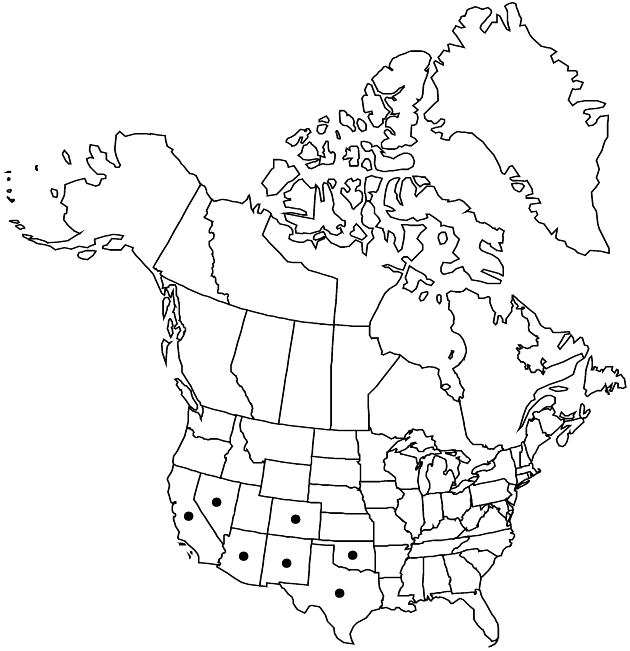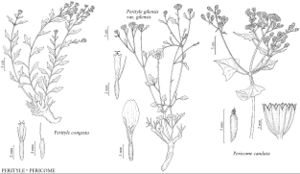Difference between revisions of "Pericome caudata"
Smithsonian Contr. Knowl. 5(6): 82. 1853.
FNA>Volume Importer |
FNA>Volume Importer |
||
| Line 12: | Line 12: | ||
|name=Pericome caudata var. glandulosa | |name=Pericome caudata var. glandulosa | ||
|authority=(Goodman) H. D. Harrington | |authority=(Goodman) H. D. Harrington | ||
| − | }}{{Treatment/ID/Synonym | + | }} {{Treatment/ID/Synonym |
|name=Pericome glandulosa | |name=Pericome glandulosa | ||
|authority=unknown | |authority=unknown | ||
| Line 30: | Line 30: | ||
|elevation=1400–3300 m | |elevation=1400–3300 m | ||
|distribution=Ariz.;Calif.;Colo.;Nev.;N.Mex.;Okla.;Tex.;Mexico (Chihuahua). | |distribution=Ariz.;Calif.;Colo.;Nev.;N.Mex.;Okla.;Tex.;Mexico (Chihuahua). | ||
| − | |discussion=<p>Populations of Pericome caudata may vary in leaf shape, head size, and indument, particularly in some far western and eastern populations. Central populations (e.g., in Colorado, New Mexico, and Arizona) tend to have relatively large, deltate-hastate leaves with long-attenuate tips and capitulescences of medium-sized heads. Specimens from Nevada and California often have smaller, ovate or cordate distal leaves with short-attenuate tips, as well as larger and fewer heads per capitulescence. Oklahoma specimens are often coarsely pubescent with copious glands and have leaves similar to the Nevada and California populations. This variability does not appear to warrant taxonomic distinction, nor does the presence or absence of pappus bristles appear to be taxonomically significant.</p> | + | |discussion=<p>Populations of <i>Pericome caudata</i> may vary in leaf shape, head size, and indument, particularly in some far western and eastern populations. Central populations (e.g., in Colorado, New Mexico, and Arizona) tend to have relatively large, deltate-hastate leaves with long-attenuate tips and capitulescences of medium-sized heads. Specimens from <i>Nevada</i> and California often have smaller, ovate or cordate distal leaves with short-attenuate tips, as well as larger and fewer heads per capitulescence. Oklahoma specimens are often coarsely pubescent with copious glands and have leaves similar to the <i>Nevada</i> and California populations. This variability does not appear to warrant taxonomic distinction, nor does the presence or absence of pappus bristles appear to be taxonomically significant.</p> |
|tables= | |tables= | ||
|references= | |references= | ||
| Line 54: | Line 54: | ||
|publication year=1853 | |publication year=1853 | ||
|special status= | |special status= | ||
| − | |source xml=https://jpend@bitbucket.org/aafc-mbb/fna-data-curation.git/src/ | + | |source xml=https://jpend@bitbucket.org/aafc-mbb/fna-data-curation.git/src/8f726806613d60c220dc4493de13607dd3150896/coarse_grained_fna_xml/V19-20-21/V21_838.xml |
|tribe=Asteraceae tribe Heliantheae | |tribe=Asteraceae tribe Heliantheae | ||
|subtribe=Asteraceae (tribe Heliantheae) subtribe Peritylinae | |subtribe=Asteraceae (tribe Heliantheae) subtribe Peritylinae | ||
Revision as of 16:37, 18 September 2019
Stems striate, terete, glabrous or hairy, often densely puberulent to tomentulose distally, sometimes gland-dotted. Leaves: petioles (5–)10–45 mm; blades (2–)3.5–12(–15) × 1–12 cm. Heads 3–30+, usually tightly clustered. Peduncles 0.5–4 cm. Involucres 4.5–10 × 4–10 mm. Phyllaries 0.5–1 mm wide, apices attenuate. Disc corollas: tubes 1–3.5 mm, throats 2–5.5 mm, lobes 0.5–1 mm. Cypselae 3–5 mm; pappi crowns to ca. 1 mm plus 0–2 bristles 1–4.5 mm. 2n = 36.
Phenology: Flowering spring–fall.
Habitat: Among rocks, boulders, on talus slopes, bluffs, crags, canyons, disturbed roadsides, in volcanic, limestone, and sandstone substrates
Elevation: 1400–3300 m
Distribution

Ariz., Calif., Colo., Nev., N.Mex., Okla., Tex., Mexico (Chihuahua).
Discussion
Populations of Pericome caudata may vary in leaf shape, head size, and indument, particularly in some far western and eastern populations. Central populations (e.g., in Colorado, New Mexico, and Arizona) tend to have relatively large, deltate-hastate leaves with long-attenuate tips and capitulescences of medium-sized heads. Specimens from Nevada and California often have smaller, ovate or cordate distal leaves with short-attenuate tips, as well as larger and fewer heads per capitulescence. Oklahoma specimens are often coarsely pubescent with copious glands and have leaves similar to the Nevada and California populations. This variability does not appear to warrant taxonomic distinction, nor does the presence or absence of pappus bristles appear to be taxonomically significant.
Selected References
None.
